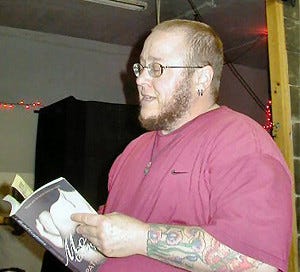Pat Califia wrote lesbian erotic classic Macho Sluts in 1994 when the lesbian feminist movement was still debating pornography. He presented female at the time and has since transitioned. At 70, he seems mostly retired but he has had an interesting life. Raised Mormon, embracing the lesbian feminist movement in the 1970s and then working within BDSM circles for decades, he is an unflinching storyteller and advocate for personal liberties.
The four poems in this collection together create a tragic love story that is both intense and horrifying. Even the titles of the four poems – Canada, Gone, Heroin, & We Really Should Stop This, You know – shows a trajectory beginning with obsession and ending with self-destruction. Most love affairs start strong and end badly, but Pat Califia goes beyond the usual tropes to a truly evil depiction of love gone bad.
The first poem “Canada” is about a women traveling to see her new girlfriend, repeating the refrain “It's another country” promising a new world of acceptance and sex in dark alleys. The narrator is skeptical. It rains just the same in Vancouver as San Francisco. Men in caterpillar hats still yell out “ugly dykes” (they shout it as it should be a capital offense), but you can deal with it better in Canada.
She's in love. She thinks that her girlfriend can redeem the city: “and I believe that | it was only after sodom and gomorrah | evicted all the queers that | the proud and unhospitable | cities on the plain | burned to the ground.” As a Bible fan, I'm always happy when someone has actually read the story of Sodom and see just how little it has to do with punishing gay people.
The poem mixes the horniness of a new relationship with intrusions of reality. The Canadian girlfriend's 15 year old son (strange and intelligent) talks about degenerate friends and scolds her for acting like a teenager with a crush. In this poem, you assume that the narrator is the degenerate he's talking about, but later poems reveal more. There was also a green card marriage that didn't work out and seven days in bed. It ends with the narrator back in the states, lonely and horny. “Jan when I remember | your tongue in my mouth | I come, standing up, | wherever I am” Who doesn't remember feeling like that? Who doesn't still feel like that even if the relationship curdled into bitterness.
In the second poem, “Gone,” Califia introduces a rival. The narrator calls and calls again three hours later and the son answers, saying that she's busy. “Now I know damn well | There's only one person | Drops in on you just any old time | And he's not a friend. | He's a lot more important than that. | And you never turn him away.” The first time I read this poem, I assumed that it was an ex-husband or an ex-boyfriend who was always in trouble. I once dated a woman who had a loser Chasidic guy living at her house. She often talked about hating him and wanting to get rid of him and his negging bullshit. Yet, when his brother called to say that he was wandering the Village drunk, she'd drop everything to go rescue him.
The narrator has other references points, particularly a woman from Queens who lived with 27 cats and a dog that she swore she'd re-home, but she never could let anyone adopt her pets. That doesn't apply here. Her girlfriend is turning blue and listening to the man's problems and talking about her past making speed in the bathroom and living with bikers. In the last stanza, Califia gives us the identity of the rival “Does living without smack anything like | Living without your cunt?” Followed by a lament that the rival isn't a dog.
Which leads into “Heroin”. In “Gone”, Califia's narrator promised to go the distance even if it's all straight down and in “Heroin,” we learn just how much the narrator wants to be with her girlfriend. Most of the poem is a clinical description of shooting up until the high kicks in and the narrator feels like two beings inside herself. “kill off enough of myself | to make room for itself | I like this a lot.” This is the turning point. The addiction to a new love becomes the addiction to heroin.
The concluding poem “We Really Should Stop This, You Know” is the end of human love. The narrator is no longer in love with the girlfriend in Canada. Instead, they are both dependent on heroin. The girlfriend in Canada wants to control the drugs. “You don't like it | When I talk to the man myself.” Then they have a fight over the fact that she's hiding the heroin until her girlfriend gets demanding.
“I don't like it when you | Take forever to cut up the brown powder | And cook it down and | Suck it up into the needle | And measure it, then take | Three times as much for yourself | As you give me.” What started out as hot sex and new love turns into just two junkies trying to share a fix. She doesn't even like sex now. She's not sulking over her unattended clit. She only wants to see this girl again if this girl is holding. “So you tell me | Is this what you want? | I bet it was what you wanted | All along.”
Total junkie logic there. The Canadian girlfriend outright accuses the narrator of only wanting her to get to her heroin. Because heroin is central to both their lives, they no longer talk about fingering each other on buses or making out in dark alleys. It's all need and holding. Maybe on the other side of addiction, they will remember but now they are two sick people hating each other over the only thing they have in common.
As much as I hate many writers in this collection, it's definitely worth reading to discover writers like Pat Califia.
Looks like the main Pat Califia book that’s still in print is Mortal Companions, a vampire erotica book.
Macho Sluts is available on Kindle.
I could really use money, so please either get a paid subscription or contribute to my Gofundme. Even $5 helps.





